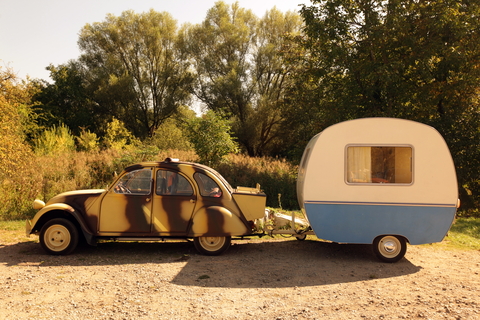
The yearning for freedom and flexibility is driving more and more people to explore the world with their own home in tow. Traveling with a caravan or motorhome promises independence and the opportunity to discover the most beautiful corners of Spain at your own pace. However, before the adventure on four wheels begins, it is essential to consider some crucial aspects to make the trip not only pleasant but, above all, safe. The Spanish Directorate-General for Traffic (DGT) and the Guardia Civil emphatically point out that driving a vehicle with a trailer or a bulky motorhome requires special attention and practice.
The Challenge at the Wheel: More Than Just Driving Straight
The DGT emphasizes that while the actual driving of a caravan can be learned, the complexity increases with specific driving maneuvers. In particular, maneuvering, parking, and negotiating tight curves pose a challenge for inexperienced drivers. The additional weight and altered dimensions of the vehicle require a proactive driving style and adjusted speeds. It is advisable to complete some practice drives on a safe terrain before the first major tour to develop a feel for the driving behavior of the combination.
The Guardia Civil’s Warning: Safety First
The Guardia Civil recently shared an informative video on their social media channels, highlighting a particularly important point: the transportation of passengers during travel. Here, there are clear differences between caravans and motorhomes that must be observed to avoid fines and, above all, dangerous situations.
A spokesperson for the Guardia Civil explains in the video that the rules for dropping off passengers while the vehicle is in motion vary depending on the type of vehicle. The core message is clear: safety takes top priority.
Clear Distinction: Passengers Strictly Prohibited in Caravans While Traveling
The most important distinction concerns the transportation of people in trailers, i.e., classic caravans pulled by a towing vehicle. Here, the regulation is unambiguous: It is strictly forbidden to be inside the caravan while the vehicle is in motion.
“In motorhomes, passengers are allowed to travel in the living area, while in caravans it is forbidden to be in the vehicle while driving,” the officer succinctly explains. This regulation serves the safety of the occupants. In the event of sudden braking or an accident, individuals in a trailer not designed for travel would be exposed to a significantly higher risk of injury. The construction of caravans is primarily designed for stationary use and does not offer adequate protection during travel.
The DGT’s Confirmation: Legal Basis for Safety
The DGT’s information strongly supports this prohibition. Their official channels clearly state that “passengers must travel in the towing vehicle with a seat belt or an approved restraint system. It is strictly forbidden to travel inside the caravan or trailer.” This clear instruction leaves no room for interpretation and underscores the need to strictly adhere to this regulation. Violations can result in significant penalties.
Exception for Integrated Motorhomes: More Flexibility for Passengers
The situation is different for vehicles where the living area is firmly integrated into the chassis – the so-called motorhomes. Here, there is greater flexibility regarding passengers in the living area. “In motorhomes, there is no limit to the number of passengers who may travel in the interior, as long as the number of people does not exceed the number of seats indicated in the vehicle’s registration certificate.”
This means that in a correspondingly approved motorhome, passengers may also travel in the rear area, provided there are approved seats with seat belts. However, it is essential to carefully check the vehicle’s registration documents before starting the journey to know the maximum permitted number of people and the positions of the approved seats.
In summary:
- Caravans: No persons are allowed to be inside the trailer while driving. All passengers must be seated and buckled up in the towing vehicle.
- Motorhomes: Passengers are allowed to travel in the living area, provided the vehicle has approved seats with seat belts and the maximum number of people specified in the registration certificate is not exceeded.
More Than Just Passengers: Other Important Aspects for Caravan Travel
In addition to the clear rules on passenger transport, there are other important points that caravan travelers in Spain should consider:
- Driving License: Ensure that your driving license is sufficient for the weight and size of the combination or motorhome. For heavier combinations, an additional driving license (Class BE) may be required.
- Speed Limits: Special speed limits apply to vehicle combinations in Spain, which are generally lower than for cars. Inform yourself in advance about the permitted maximum speeds on different types of roads.
- Traffic Laws: Familiarize yourself with Spanish traffic laws, especially regarding overtaking, parking, and driving on certain roads or areas.
- Registration and Insurance: Your caravan or motorhome must be properly registered and insured. Carry all relevant documents with you.
- Technical Inspection (ITV): Similar to the MOT in the UK, caravans and motorhomes in Spain must undergo regular technical inspections (ITV). Ensure your ITV is valid.
- Weight Regulations: Never exceed the permitted total weight of your combination or motorhome. Overloading can not only be dangerous but can also lead to significant penalties.
- Load Securing: Stow your load securely in the caravan or motorhome so that it cannot slip or pose a hazard while driving.
- Consideration: Be considerate of other road users and residents, especially in campsites and residential areas.
Conclusion: Well-Informed and Safe on the Road
Traveling through the diverse landscapes of Spain with a caravan or motorhome is a wonderful way to get to know the country and its people. With the right preparation and by observing the traffic laws, especially the important advice from the DGT and Guardia Civil regarding passenger transport, nothing stands in the way of an unforgettable and, above all, safe holiday. Invest some time in planning and information to fully enjoy the freedom on wheels. ¡Buen viaje!



